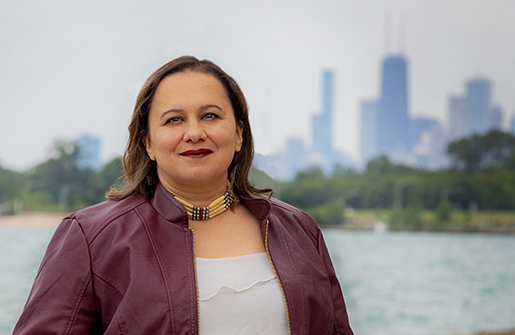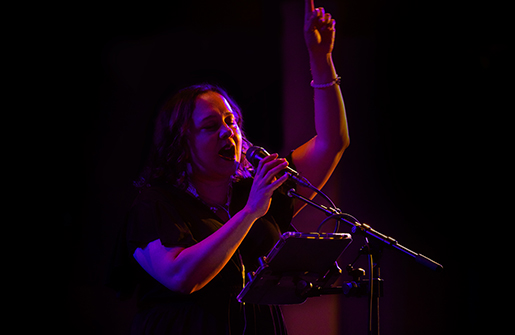
Sunita Puleo remembers the first time she experienced the mystifying power of music to break down linguistic and cultural barriers. She was 15 years old, singing a jazz solo while visiting a coal town in the Czech Republic. “The local audience, accustomed to stoicism, sat straight and stone-faced through my jazz choir’s songs as we tried to woo them with our sounds,” she writes on her website for Fuse Integrative Arts. “During my short solo . . . I determined to make this older man in the eighth row smile. I sang my heart out in French, which I’m sure he didn’t understand. I emoted, I moved, and I willed my sounds to break through this cultural barrier that I barely understood. In the middle of the last line, a small smile spread across his face.”
Born to an Indian father and an Irish-English-American mother, Sunita grew up in Jackson Heights, one of the most ethnically diverse neighborhoods in New York’s borough of Queens, the world’s capital of linguistic diversity. “My dad owned a sari shop in Little India, and the sounds of my early childhood are this mix of Ravi Shankar and Joni Mitchell,” she reminisces fondly. The din of a multitude of tongues and the variety of music on the street defined her experience of home. And these earlier years—marked by special memories like that moment in a Czech town—shaped her heart for connecting people across cultures.
As a girl, Sunita had dreams of helping set the world right by becoming a Supreme Court justice. But in college, a seemingly trivial decision to add a voice major to her government and politics degree ended up radically shifting her trajectory. Her voice teacher, Joan Jurenas, was a Christian and eventually became a beloved mentor, nurturing the gifts God had planted in the young Sunita. “She had me sing with a pencil in my mouth, between my teeth, for about a year,” recalls Sunita. “It was because I had a really tight jaw, and I was really controlling of myself and my voice.”
Joan told Sunita, “Your job as a singer is to learn how to open yourself up and posture yourself so that the voice God gave you can come out.”
As Sunita learned to approach singing in a new way, she found that God was guiding her to approach her life this way too. She dropped her law major and pursued a career as a professional singer. She eventually fused her passion for singing and her heart for the world by joining the creative arm of The Navigators to develop a local community for musicians and creatives in New York City.

Yolanda “Yo” Miller leads spiritual formation groups for Fuller, the De Pree Center, and Soul Care in Boulder, Colorado. Learn more about her and her work as a soul coach at yo-miller.com.

Karley Carrillo is a creative content producer for Christian Assembly Church in Los Angeles and a freelance photographer. See more of her work at itsmekarley.com.
Sunita Puleo remembers the first time she experienced the mystifying power of music to break down linguistic and cultural barriers. She was 15 years old, singing a jazz solo while visiting a coal town in the Czech Republic. “The local audience, accustomed to stoicism, sat straight and stone-faced through my jazz choir’s songs as we tried to woo them with our sounds,” she writes on her website for Fuse Integrative Arts. “During my short solo . . . I determined to make this older man in the eighth row smile. I sang my heart out in French, which I’m sure he didn’t understand. I emoted, I moved, and I willed my sounds to break through this cultural barrier that I barely understood. In the middle of the last line, a small smile spread across his face.”
Born to an Indian father and an Irish-English-American mother, Sunita grew up in Jackson Heights, one of the most ethnically diverse neighborhoods in New York’s borough of Queens, the world’s capital of linguistic diversity. “My dad owned a sari shop in Little India, and the sounds of my early childhood are this mix of Ravi Shankar and Joni Mitchell,” she reminisces fondly. The din of a multitude of tongues and the variety of music on the street defined her experience of home. And these earlier years—marked by special memories like that moment in a Czech town—shaped her heart for connecting people across cultures.
As a girl, Sunita had dreams of helping set the world right by becoming a Supreme Court justice. But in college, a seemingly trivial decision to add a voice major to her government and politics degree ended up radically shifting her trajectory. Her voice teacher, Joan Jurenas, was a Christian and eventually became a beloved mentor, nurturing the gifts God had planted in the young Sunita. “She had me sing with a pencil in my mouth, between my teeth, for about a year,” recalls Sunita. “It was because I had a really tight jaw, and I was really controlling of myself and my voice.”
Joan told Sunita, “Your job as a singer is to learn how to open yourself up and posture yourself so that the voice God gave you can come out.”
As Sunita learned to approach singing in a new way, she found that God was guiding her to approach her life this way too. She dropped her law major and pursued a career as a professional singer. She eventually fused her passion for singing and her heart for the world by joining the creative arm of The Navigators to develop a local community for musicians and creatives in New York City.
Yolanda “Yo” Miller leads spiritual formation groups for Fuller, the De Pree Center, and Soul Care in Boulder, Colorado. Learn more about her and her work as a soul coach at yo-miller.com.
Karley Carrillo is a creative content producer for Christian Assembly Church in Los Angeles and a freelance photographer. See more of her work at itsmekarley.com.


By 2014, she had married and had four children with her husband, James, who was pastoring in New York City when he decided to pursue an MDiv at Fuller. The family relocated to Pasadena, but when they arrived, Sunita found herself lonely and bored, and she applied to Fuller’s intercultural studies program—which she’d been quietly pining after for a few years. She says, “I ended up getting a scholarship and it was life-changing. For the first six months, I’d come home from class almost every day in tears of gratitude, so grateful that I finally had this chance to unite all the parts of me: to have a Christian education to integrate my faith with my singing.”
Roberta King, now senior professor of communication and ethnomusicology, became another treasured mentor for Sunita. “I took all of Roberta King’s classes and basically followed her around,” Sunita laughs. “She was singing with a Middle Eastern orchestra that met across the street from the Pasadena campus at the Masonic Temple and she said, ‘Come with me!’” This eventually led to Sunita initiating a project in Pasadena public schools with some of these Middle Eastern musicians, through which they built bridges among students of different cultures.
Sunita’s years at Fuller, and her work with Dr. King, were formative in connecting her call to music with her passion for creating bridges between different peoples. Her time at Fuller culminated in her final project called the Fuse Music Project, which was a precursor of more that was yet to come.
The Fuse Music Project was not just another musical production, and it did not begin with vocal warmups and arduous rehearsals. Instead, the first rehearsals began with tea and the sharing of five women’s stories. As they revealed their hearts and identities to one another, they began to share their songs. As they shared their songs, they worked together to build the harmonies and the movements that would weave their stories together into a single multilayered tapestry of sight and sound, even as it preserved each artist’s distinct sound and stories.
On opening night, Sunita was unprepared for the audience’s response. After one of the performances, people didn’t only offer a standing ovation, but many were moved to tears. “They just wouldn’t stop clapping and crying!” Sunita says. “I looked at another member of my cohort who was a pastor and said, ‘What do we do?’ She said, ‘We’re just going to hug them.’ So we held people while they wept and told us their stories.”
People shared story after story of how the experience had opened up memories of their own cultural background or stirred up questions about their past engagements with those of different cultures and how they could go deeper.


The experience was an epiphany for Sunita. “With the Fuse Music Project, I thought, ‘Wow, my life has kind of come together.’ I think it really solidified for me that this was something that was important, something that I really wanted to do.” She began to imagine what it might look like to weave all her gifts together to extend the experience on a larger scale. A business coach helped her birth Fuse Integrative Arts, an experience-design consulting and team-building company that uses the performing arts to assist organizations seeking to develop unity among diverse members, as well as to forge connections among diverse creatives and artists.
Sunita’s work is more elaborate than planning or leading music for worship services and conferences. She encourages bonding among diverse teams. Her philosophy is that the embodied arts work together with the rest of the content to bring a fuller experience and understanding to its participants. “When I’m helping to design a gathering, I help people grab onto the content with their five senses and not just with their minds,” she says. This leads Sunita to invent a variety of creative embodied experiences in her different work contexts.
Sunita, who also serves as a co-city director of The Navigators in Chicago with her husband, is currently planning such an activity for an upcoming Navigators conference. She’ll be hosting an international candy fest, where participants will bring candies that evoke childhood memories. They’ll swap flavors as well as stories to help teammates develop, in an experiential way, a deeper understanding and appreciation of the people they’re working with.
Sunita’s vision for Fuse stretches beyond Christian audiences, and an evangelist’s heart beats at its core. She has a philosophy of mission that flows from a holistic and embodied approach to relationship. “What is the good news?” she says. “The good news is not just Jesus as the substitute for our sins. It’s not just Jesus giving us honor or removing our shame. It’s not just being folded back into the family of God. It’s not just healing for the sick. It’s not just healing for your soul. It’s not just heaven. Jesus’ good news is pervasive to every cell, every molecule, every relationship, every aspect of our being.”
Communicating this good news, Sunita says, “happens at every level of interaction in our world. So, if I bring the Spirit of God with me, and I interact in wholeness and in genuineness with another person, with my song, I believe that is participating in God’s mission.” For Sunita, words may not always necessarily be the best point of connection. “People are really hungry for an experiential knowledge of God.” Music can do this, she explains. “Sound is much more powerful than we give it credit for.”
What Sunita has come to recognize is that she does not need to save the world; Jesus already has. But she has discovered that she is uniquely equipped and called to bring together diverse people in the world through the gift of music and the gift of being herself. She is taking her mentor’s advice: “Open yourself up and posture yourself in such a way that the voice God gave you can come out.”
Sunita says, “I posture myself as I walk in unity with the Spirit of God, as I allow Christ to fill my life, as I allow myself to align with God as expressed in God’s Word. As I’m living my life in loving connection to God, I’ll live my life in loving connection to others.” For Sunita, the voice that comes out isn’t just words, or even just music, but love in action.
With a hopeful heart for the church’s youngest generations, Meredith Miller (MDiv ’08) invites the church into new ways of ministering to our children—helping them to encounter, to know, and to trust God.